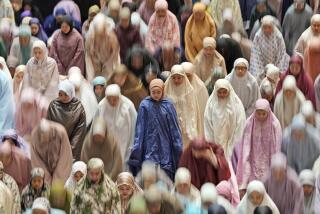Muslim Conference Focuses on Ethnic, Cultural Diversity
- Share via
ABIQUIU, N.M. — North American Muslims, many of them U.S. converts to Islam, gathered last weekend for the third annual North American Muslim Powwow, a meeting marked by cultural and ethnic diversity.
“You can’t find a more diverse Muslim community in the world than what exists here in the United States,” said Sulayman S. Nyang, professor of African and Islamic Studies at Howard University in Washington.
Nyang said the U.S. Muslim community reflects the diversity of American society and is characterized by differences in nationality, by the varying degree to which the religion is practiced by individual Muslims, and by different perceptions of life between immigrant and native-born Muslims.
There were 5 million Muslims in the United States in 1990; 56% of them were immigrants and 44% were native-born, according to the most recent data from the American Muslim Council. California, New York state and Illinois had the highest number of Muslim residents.
Among U.S. Muslims, 42% were African American and 24% were of South Asian descent (predominantly Indian and Pakistani). Another 12% were of Arab descent, while most of the remainder were of African, Iranian, Turkish, Southeast Asian, and East European descent, the council said. Only 1.6% were white American-born Muslims.
The council said there were 843 mosques in 1990, although Nyang put the current number at 1,500.
Last weekend’s gathering was sponsored by Dar Al Islam, a nonprofit corporation that serves the North American Muslim community and educates non-Muslims about Islam. Dar Al Islam operates the Muslim retreat center here, conducts workshops across the country and runs a monthlong training program on Islam for public and private school teachers. The program is aimed at increasing American understanding of the religion.
Nyang told the conference that the American Jewish and Catholic communities provide important lessons for U.S. Muslims.
The Jewish community, he said, has largely succeeded in uniting observant and non-religious Jews to forge a strong community, and Muslims should do the same.
The Catholic community, he said, “provides a model for bridging gaps among people of different national origins.”
Participants at the gathering also cited American Catholicism as a religious movement that overcame prejudice and negative stereotyping in the early 20th Century--a challenge faced today by American Muslims.
“There is a great deal of hurt among Muslims that we were so quickly blamed for the tragedy in Oklahoma,” said a woman who asked not to be identified.
Besides issues of diversity and social stereotypes, the conference focused on how the leadership structures of Muslim organizations might better integrate women.
More to Read
Sign up for Essential California
The most important California stories and recommendations in your inbox every morning.
You may occasionally receive promotional content from the Los Angeles Times.













